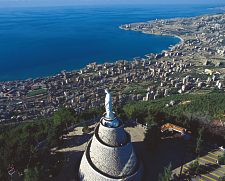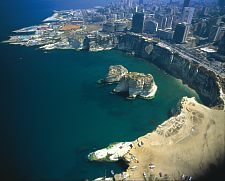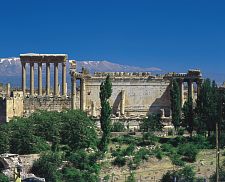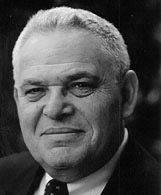|





| |
 Iran’s
Pre-Emptive Strike Iran’s
Pre-Emptive Strike
by Edward N. Luttwak*
Iran’s quarreling and competing leaders have decided, by
their acts, to reject the offer by Europe and the United States of a nuclear
reactor, aircraft spare parts, economic cooperation, and more in exchange for
giving up uranium enrichment. Many people hoped that Iran’s leaders, despite
their extremism, would accept the offer if only to avoid sanctions – which are
sure to come even if China and Russia refuse to support them in the United
Nations Security Council. The US and Europe are united this time, and can
effectively cut off Iran from world banking, bar Iranian leaders from traveling
to the West, and stop exports to Iran of everything but food and medicine.
Instead of waiting passively for sanctions, Iran’s leaders decided to start a
Middle East crisis by organizing attacks against Israel. Their aim is to
discourage the US and the Europeans from starting another crisis – financial
markets and everyday politics in Europe can tolerate only so much conflict. They
may also hope to shatter the unified EU/US position that now exists.
Moreover, Iran’s claim to leadership in the Muslim world is being undermined by
the conflict in Iraq, where Iran supports the Shia militias that are killing
Sunnis. Every bloody day of bombings and executions in Iraq reminds Arabs that
the Iranians are neither Arab nor Sunni. But attacking Israel unites Muslims,
and gains Arab gratitude.
Iran’s move was prepared in a series of meetings with both Hamas and Hezbollah
in Lebanon. Khaled Mashal, Hamas’s overall leader, who lives under Syrian
protection in Damascus, traveled to Tehran, where he received some $50 million
in badly needed cash. Although an offshoot of the Sunni Muslim Brotherhood,
whose Arab financial supporters loathe the Ayatollahs, Hamas decided to
cooperate in Iran’s scheme because it was diplomatically isolated and cut off
from Western funding due to its refusal to recognize Israel.
Hamas acted by increasing rocket attacks on nearby Israeli territory, and by
launching a raid into Israel itself, killing two soldiers and capturing another.
That provoked Israeli retaliation, starting the Gaza end of the crisis that Iran
wanted. As for the impact on lives in Gaza, Hamas – like Yasir Arafat – has
again shown itself to be more devoted to the idea of Palestine than to the
welfare of Palestinians.
It was far more costly to get Hezbollah to serve Iran’s strategy. While it
retains a heavily armed, salaried, and uniformed guerilla/terrorist force of
some 5,000, its leader, Hassan Nasrallah, has been striving for years to build
Hezbollah into a legitimate political party and the main representative of
Lebanon’s Shia. This effort was so successful that Hezbollah now has two
ministers in the government.
But to be accepted by other Lebanese, and to some extent even to retain the
support of fellow Shia, Hezbollah had to agree to join the Lebanese consensus on
the priority of reconstruction and economic recovery after years of civil war.
That meant avoiding a war with Israel.
Hezbollah is under order by the UN Security Council to disarm and disband its
militia, but it claimed that even after Israel’s full withdrawal from Lebanon in
2000, it needed its weapons to continue to liberate “Lebanese territory.” That
refers to a tiny fragment of land, the so-called Sheba farms, declared by UN
inspectors to be in Israel, but which Hezbollah claims as part of Lebanon.
Other Lebanese political parties agreed that Hezbollah could keep its weapons to
fight there – but only on condition that it keep the peace on the rest of the
border. That is the condition Nasrallah violated by ordering an attack on an
Israeli patrol nowhere near the Sheba farms and launching rockets into Israeli
territory. With that, Hezbollah threw away its political position in Lebanon.
For the Israeli coalition government headed by Prime Minister Ehud Olmert,
matters are relatively simple. It ordered the withdrawal from Gaza in order to
stop the cycle of violence there, on the presumption that Israeli territory
proper would not be attacked. But the possibility of attack was of course
anticipated, and military planners determined that the only possible response
was to counterattack as heavily and for as long as might be needed, until
Palestinian attacks would stop, whether from exhaustion or agreement.
Hamas’s control of the Palestinian Authority does not diminish or increase the
need for Israeli military action, but it does increase its political benefits,
because the fighting and destruction tells Gaza’s population that their rulers
are endangering their physical survival.
As for Hezbollah, the Israeli military response is by no means confined to
retaliation. Over the years, Hezbollah has received and stored several thousand
rockets and some one hundred longer-range missiles from Iran. Recently, and very
revealingly, two Iranian leaders threatened Israel with bombardment by
Hezbollah’s rockets if Israel attacked Iran’s nuclear installations. Thus,
Israel is using the opportunity brought by the current fighting to search out
and destroy Hezbollah’s underground and other hidden sites where it keeps its
rockets and missiles.
Israel’s political aim is to destroy Hezbollah’s position as a legitimate
Lebanese political party by exposing it as the paid agent of Iran, which serves
foreign interests at grievous cost to Lebanon. So Israel is blocking Lebanon’s
ports from the sea, has breached the runways of all three jet-capable airfields,
including Beirut’s international airport, and remains ready to destroy
generating plants and other high-value targets, if necessary, to generate
sufficient political pressure on Hezbollah.
If Lebanon’s political forces and Nasrallah’s followers cannot get him to revert
to a truce, Israel will bomb more targets, including Nasrallah’s offices in
south Beirut. If more missiles are launched, Israel will cross the border deep
into Lebanese territory.
Of course, in both Gaza and southern Lebanon, the outcome is pre-determined by
the one-sided military balance. The only open question in both places is how
much damage Israel will need to inflict to obtain new cease-fires.
*Edward N. Luttwak, a Military Strategist and Consultant,
is a Senior Fellow at the Center for Strategic and International Studies,
Washington, D.C.
Copyright: Project Syndicate, 2006.
|